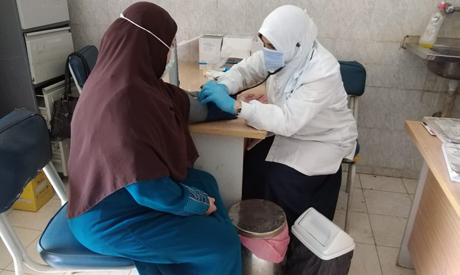
The initiative has provided treatment for more than 500,000 people with nephropathies
Minister of Health and Population Hala Zayed announced this week that 16 million citizens have been tested as part of the presidential initiative to treat chronic diseases and detect nephropathy in its earliest stages. Nephropathy is a disease of the kidneys caused by damage to the small blood vessels or to the units in the kidneys that clean the blood.
The initiative, which started at the end of September and will continue until the end of December, is part of the presidential 100 Million Healthy Lives campaign. It provides screening for chronic diseases such as diabetes, hypertension and cardiac disease. It also examines patients with renal impairment due to chronic diseases and measures body mass index. This is in addition to providing health education for those who are reluctant to take part in the plan.
The idea targets people over the age of 40. Since the beginning of the initiative, the Ministry of Health has provided free medical treatment to more than 1.5 million people suffering from chronic diseases and more than 500,000 with nephropathies, Zayed said.
Ministry spokesman Khaled Megahed pointed out that the governorates of Sharqia, South Sinai, Ismailia, Menoufiya, Assiut, Daqahliya, and Damietta have had the highest rate of people suffering from nephropathies. “After the initiative ends the ministry will study the reasons behind the high percentage of people suffering from kidney diseases,” stressed Megahed.
The ministry, according to Megahed, has conducted more than 60,000 seminars to raise the awareness of the public and healthcare workers regarding chronic diseases as well as nephropathies. The seminars take place at the country’s medical facilities and public spaces. “The initiative provides its medical services to people via 5,400 ministry health units and medical centres located all over the country. In addition, more than 750 medical convoys and 757 mobile teams have been deployed in public areas,” Megahed said.
Megahed noted that since the beginning of the initiative 40 per cent of the ministry’s dialysis units across the country have been refit. Around 2,600 new dialysis machines and 1,000 chairs have been introduced to the dialysis units for LE1.9 billion. When tested, patients who are proven positive for any of the diseases treated under the plan are referred to the ministry’s hospitals for further tests. “Patients are then provided with the required medical treatment for free via a follow-up card given to each,” added Megahed.
Nephropathy Early Detection, part of the 100 Million Healthy Lives campaign, contributed to the early detection of chronic nephropathy among the most vulnerable groups in society who are diabetic, suffer hypertension, urinary obstruction, and those with recurrent kidney stones to stop disease progression and restore kidney function.
The campaign includes a number of initiatives for the welfare of Egyptians. The most important is eradicating virus C, the early detection of breast cancer for women, the early detection of anemia, obesity and stunting, and non-communicable diseases such as blood pressure, diabetes and cardiovascular disease.
Ahmed Al-Sabaawi, a member of the initiative and rapporteur of the National Committee for Combating Non-communicable Diseases, said the presidential initiatives have wiped out many diseases in Egypt. “As a result of the presidential initiatives, 60 per cent of citizens have been registered in the ministry’s health files, thus facilitating the process of undergoing future medical examination for the families.
“The ministry has adopted the second generation of automated health units linked to a central system. The future of health systems is their mechanisation,” Al-Sabaawi said.
*A version of this article appears in print in the 26 November, 2020 edition of Al-Ahram Weekly
Short link: